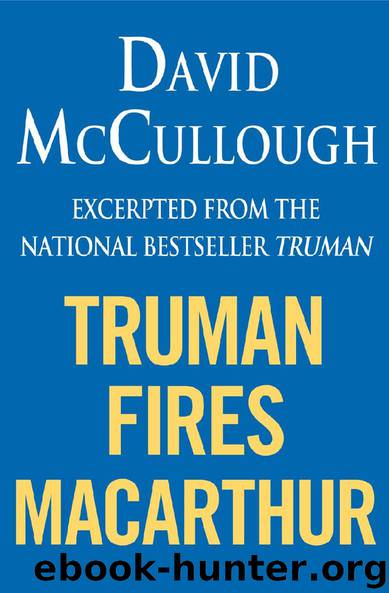Truman Fires MacArthur by David McCullough

Author:David McCullough
Language: eng
Format: epub
Publisher: Simon & Schuster
Published: 2010-07-15T00:00:00+00:00
TRUMAN FIRES MACARTHUR
The headline across the early edition of the Washington Post, April 11, 1951, was the headline everywhere in the country and throughout much of the world, with only minor variations. The reaction was stupendous, the outcry from the American people shattering. Truman had known he would have to face a storm, but however dark his premonitions, he could not possibly have measured what was coming. No one did, no one could have. One southern senator in the course of the day described the people in his part of the country as “almost hysterical.” The senator himself was almost hysterical. So were scores of others on Capitol Hill and millions of Americans.
The day on Capitol Hill was described as “one of the bitterest . in modern times.” Prominent Republicans, including Senator Robert A. Taft, spoke angrily of impeaching the President. The full Republican leadership held an angry emergency meeting in Joe Martin’s office at 9:30 in the morning, after which Martin talked to reporters of “impeachments,” the accent on the plural. “We might want the impeachments of 1 or 50.” A full-dress congressional investigation of the President’s war policy was in order. General MacArthur, announced Martin, would be invited to air his views before a joint session of Congress.
Senator Nixon demanded MacArthur’s immediate reinstatement. Senator William E. Jenner declared the country was “in the hands of a secret coterie” directed by Russian spies. When, on the floor of the Senate, Jenner shouted, “Our only choice is to impeach President Truman and find out who is the secret invisible government which has so cleverly led our country down the road to destruction,” the gallery broke into applause.
A freshman Democrat from Oklahoma, Senator Robert Kerr, rose to defend the President. If the Republicans believed the nation’s security depended on following the policy of General MacArthur, Kerr said, then they should call for a declaration of war against Red China. Otherwise, Republican support of MacArthur was a mockery. Senator Tom Connally of Texas reminded his colleagues that Americans had always insisted on civilian control over the military, and three Senate Republicans, James H. Duff of Pennsylvania, Leverett Saltonstall and Henry Cabot Lodge, Jr., of Massachusetts, spoke in agreement.
But such voices were lost in a tempest of Republican outrage. The general’s dismissal was “another Pearl Harbor,” a “great day for the Russian Communists.” MacArthur had been fired “because he told the truth.” “God help the United States,” said Senator James P. Kem, Republican of Missouri.
In New York two thousand longshoremen walked off their jobs in protest over the firing of MacArthur. A Baltimore women’s group announced plans for a march on Washington in support of the general. Elsewhere enraged patriots flew flags at half-staff, or upside down. People signed petitions, fired off furious letters and telegrams to Washington. In Worcester, Massachusetts, and San Gabriel, California, Truman was burned in effigy. In Houston, a Protestant minister became so angry dictating a telegram to the White House that he died of a heart attack.
The legislatures
Download
This site does not store any files on its server. We only index and link to content provided by other sites. Please contact the content providers to delete copyright contents if any and email us, we'll remove relevant links or contents immediately.
| Africa | Americas |
| Arctic & Antarctica | Asia |
| Australia & Oceania | Europe |
| Middle East | Russia |
| United States | World |
| Ancient Civilizations | Military |
| Historical Study & Educational Resources |
In Cold Blood by Truman Capote(3366)
The Innovators: How a Group of Hackers, Geniuses, and Geeks Created the Digital Revolution by Walter Isaacson(3111)
Steve Jobs by Walter Isaacson(2879)
All the President's Men by Carl Bernstein & Bob Woodward(2357)
Lonely Planet New York City by Lonely Planet(2204)
And the Band Played On by Randy Shilts(2180)
The Room Where It Happened by John Bolton;(2141)
The Poisoner's Handbook by Deborah Blum(2123)
The Innovators by Walter Isaacson(2088)
The Murder of Marilyn Monroe by Jay Margolis(2085)
Lincoln by David Herbert Donald(1977)
A Colony in a Nation by Chris Hayes(1912)
Being George Washington by Beck Glenn(1872)
Under the Banner of Heaven: A Story of Violent Faith by Jon Krakauer(1783)
Amelia Earhart by Doris L. Rich(1680)
The Unsettlers by Mark Sundeen(1675)
Dirt by Bill Buford(1661)
Birdmen by Lawrence Goldstone(1651)
Zeitoun by Dave Eggers(1630)
